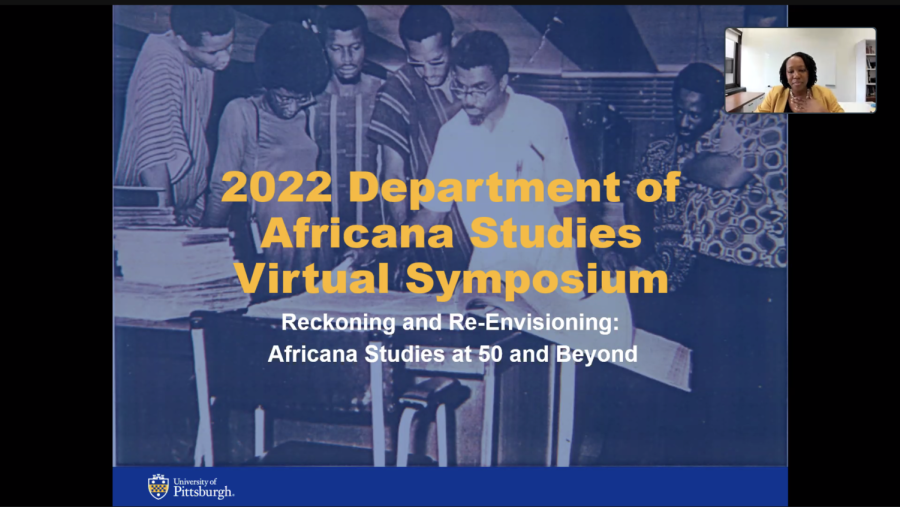‘Seized the time’: Panelists discuss past, present and future of Africana studies at Pitt
A virtual panel called “Reflections on Africana Studies at Pitt” hosted by the Department of Africana Studies on Friday.
April 3, 2022
Though many community members supported the Black Action Society’s initiatives to establish an Africana studies department at Pitt in 1969, Curtiss Porter said the political climate at the time presented the department’s pioneers with significant challenges.
“It [was] kind of like trying not to melt like chocolate in the mouth of the devil. We were establishing and growing a counterintuitive notion in a largely antagonistic system,” Porter, chancellor emeritus at Penn State’s Greater Allegheny campus, said. “We were trying to establish a notion in a system that suggested that we didn’t exist or ought not to exist, or certainly ought not to exist along the line that we projected our existence.”
To honor its 50th anniversary, the department hosted a series of four, one-day virtual symposium panels last week under the title “Reckoning and Re-envisioning: Africana Studies at 50 and Beyond.” The first was titled “Reflections on Africana Studies at Pitt,” and panelists from the department discussed goals and obstacles from the past, present and future.
Moderated by chair Yolanda Covington-Ward, the panel discussion included Porter and Jack Daniel, a former vice provost and dean of students. Both were founding members of BAS, an organization key to the department’s creation.
After a brief introduction by Chancellor Patrick Gallagher and Provost Ann Cudd, Covington-Ward said several major changes will soon take place in the department.
“We are submitting a proposal for a graduate program in Africana Studies, a Ph.D. program, which is now going through review, and also have a number of other initiatives going on from programming, to revamp the entire curriculum to be a bit more flexible for students. In addition to that, our department just underwent a major renovation,” Covington-Ward said.
Throughout the event, Daniel and Porter reflected on challenges faced by the department as it was established. The 1969 computer center takeover, during which BAS staged a sit-in at the Cathedral of Learning to demand various reforms from Pitt, sparked the creation of what was originally called the Black studies department.

(Zoom screenshots)
Though the panelists acknowledged how far the department has come since its creation in 1969, Daniel said community members should keep BAS’ original vision for Black studies at Pitt in mind as they look to the future of the department.
“The two of us together wrote what’s known as ‘The Black Paper for Black Studies.’ I would encourage people to get that from the [department] archive because in that [paper], we laid out the vision for a school of Black studies, not simply a department of Black studies, and in my opinion, that still warrants consideration,” Daniel said.
Porter also said what was then known as Black studies couldn’t have transformed from an idea to reality if it weren’t for support from the community.
“We had a broad base of support, of course, the leadership support came through the Black Action Society [which was] composed primarily of students, but had a broad base of community support,” Porter said. “In addition to that [we had the support of] what one might call the ‘old-line civil rights organizations.’ I recall Byrd Brown and Alma Fox, who were the leadership of the NAACP … and then the grassroots people.”
Though the department navigated through what Covington-Ward called the “shark-infested waters” of the late ‘60s and early ‘70s, the panelists said the department still has room for improvement.
Creating an endowed scholarship for Africana studies majors is just one example of such improvements, according to Daniel.
“I think it takes about $20,000 these days to approve an undergraduate scholarship … it would be really interesting to see a multimillion dollar endowment in the next [major fundraising] campaign and scholarships for majors in Africana studies directly tied to the department,” Daniel said. “A multimillion dollar endowment would be quite a thing to help solidify the department.”
With the involvement of activists, donors, students and faculty, Porter hopes to see the Africana studies department take off into another 50 years of progress, innovation and excellence.
“[Mark] Zuckerberg didn’t invent the notion of ‘moving fast and breaking stuff,’ it was definitely Black people, Black studies and Black power,” Porter said. “We definitely seized the time, and I think one needs to do that now all the time and our ability to do that [then] was definitely tied with our ability to be tied with the community.”








